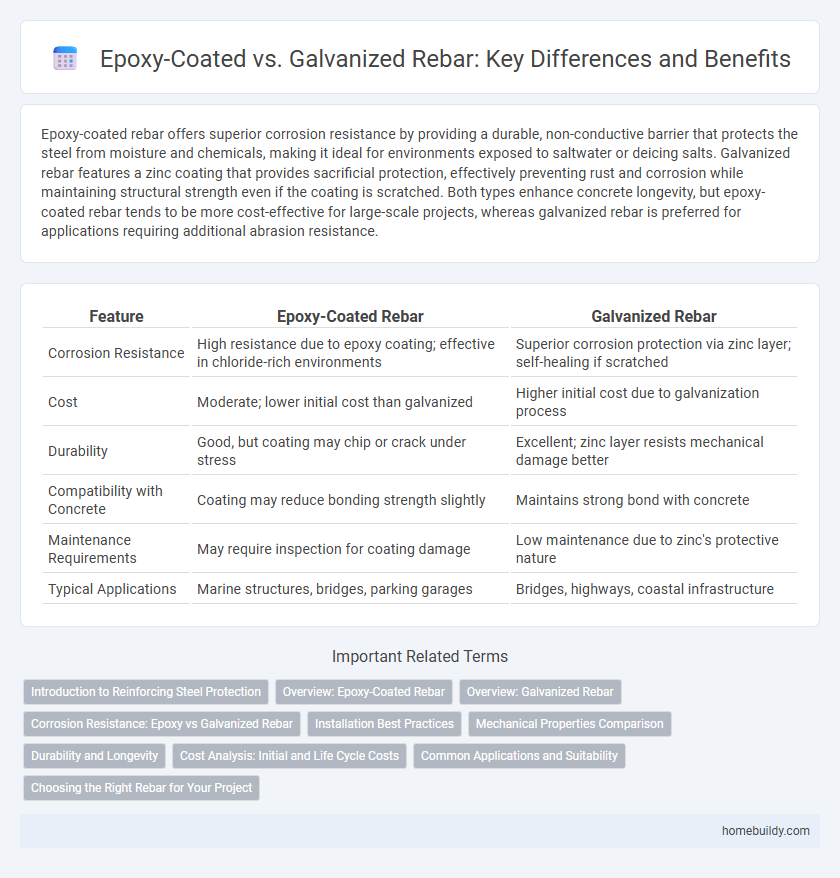Epoxy-coated rebar offers superior corrosion resistance by providing a durable, non-conductive barrier that protects the steel from moisture and chemicals, making it ideal for environments exposed to saltwater or deicing salts. Galvanized rebar features a zinc coating that provides sacrificial protection, effectively preventing rust and corrosion while maintaining structural strength even if the coating is scratched. Both types enhance concrete longevity, but epoxy-coated rebar tends to be more cost-effective for large-scale projects, whereas galvanized rebar is preferred for applications requiring additional abrasion resistance.
Table of Comparison
| Feature | Epoxy-Coated Rebar | Galvanized Rebar |
|---|---|---|
| Corrosion Resistance | High resistance due to epoxy coating; effective in chloride-rich environments | Superior corrosion protection via zinc layer; self-healing if scratched |
| Cost | Moderate; lower initial cost than galvanized | Higher initial cost due to galvanization process |
| Durability | Good, but coating may chip or crack under stress | Excellent; zinc layer resists mechanical damage better |
| Compatibility with Concrete | Coating may reduce bonding strength slightly | Maintains strong bond with concrete |
| Maintenance Requirements | May require inspection for coating damage | Low maintenance due to zinc's protective nature |
| Typical Applications | Marine structures, bridges, parking garages | Bridges, highways, coastal infrastructure |
Introduction to Reinforcing Steel Protection
Epoxy-coated rebar provides a corrosion-resistant barrier by encasing steel in a durable epoxy resin, ideal for environments with high chloride exposure such as coastal structures. Galvanized rebar features a zinc layer that offers sacrificial protection against rust, extending the lifespan of concrete reinforcement in aggressive conditions. Both methods enhance reinforcing steel durability by preventing corrosion, which is critical to maintaining structural integrity and reducing maintenance costs.
Overview: Epoxy-Coated Rebar
Epoxy-coated rebar features a protective polymer layer that inhibits corrosion caused by moisture and chloride exposure, making it ideal for marine and bridge construction projects. This coating enhances the steel's durability and lifespan without significantly increasing the rebar's diameter or weight. Despite its corrosion resistance, epoxy-coated rebar requires careful handling to prevent coating damage during installation, which could compromise its protective properties.
Overview: Galvanized Rebar
Galvanized rebar features a protective zinc coating that offers superior corrosion resistance, especially in environments exposed to moisture and chlorides. This coating significantly extends the lifespan of concrete structures by preventing rust and deterioration. Unlike epoxy-coated rebar, galvanized rebar maintains better adhesion with concrete while providing a more uniform and durable protective barrier.
Corrosion Resistance: Epoxy vs Galvanized Rebar
Epoxy-coated rebar provides a barrier that prevents moisture and chlorides from reaching the steel surface, offering effective corrosion resistance in environments exposed to saltwater or deicing chemicals. Galvanized rebar features a zinc coating that sacrifices itself to protect the steel, providing long-term corrosion protection even if the coating is scratched or damaged. While both types enhance durability, galvanized rebar generally delivers superior corrosion resistance in harsh and highly corrosive environments compared to epoxy-coated rebar.
Installation Best Practices
Epoxy-coated rebar requires careful handling to avoid damage to the protective coating, ensuring proper adhesion and corrosion resistance during installation. Galvanized rebar, while more resistant to scratches, necessitates clean, rust-free surfaces and proper overlap techniques to maintain coating integrity and maximize durability. Both types should follow manufacturer guidelines for cutting and bending to preserve protective layers and optimize structural performance.
Mechanical Properties Comparison
Epoxy-coated rebar exhibits superior corrosion resistance with slightly reduced bond strength compared to galvanized rebar, which offers enhanced mechanical adhesion and ductility. Galvanized rebar maintains higher tensile strength and impact resistance due to its zinc coating, while epoxy-coated rebar's polymer layer provides effective protection against chloride-induced corrosion. The choice between epoxy-coated and galvanized rebar hinges on project-specific mechanical property requirements such as tensile strength, bond performance, and long-term durability in corrosive environments.
Durability and Longevity
Epoxy-coated rebar offers excellent corrosion resistance by providing a protective barrier against moisture and chloride ions, significantly extending its lifespan in harsh environments. Galvanized rebar, coated with a layer of zinc, provides sacrificial protection that maintains durability even if the coating is scratched, offering enhanced longevity under corrosive conditions. Both materials improve the structural integrity of concrete by preventing rust-induced damage, but galvanized rebar generally outperforms epoxy-coated rebar in long-term durability due to its self-healing galvanic properties.
Cost Analysis: Initial and Life Cycle Costs
Epoxy-coated rebar typically offers a lower initial cost compared to galvanized rebar, making it a preferred choice for budget-sensitive projects. However, galvanized rebar provides superior corrosion resistance, reducing maintenance and replacement expenses over the structure's lifespan. Life cycle cost analysis often favors galvanized rebar for environments with high corrosion risk, despite its higher upfront investment.
Common Applications and Suitability
Epoxy-coated rebar is commonly used in marine structures, bridges, and parking garages due to its superior corrosion resistance in chloride-rich environments. Galvanized rebar is preferred for industrial facilities and wastewater treatment plants where enhanced durability against chemical exposure is critical. Both types improve rebar longevity, but epoxy-coated rebar is better suited for areas with high salt exposure, while galvanized rebar excels in aggressive chemical settings.
Choosing the Right Rebar for Your Project
Epoxy-coated rebar offers superior corrosion resistance in chloride-rich environments, making it ideal for marine or coastal construction projects, while galvanized rebar provides a robust zinc barrier that enhances durability in less aggressive conditions with better impact resistance. Selecting the right rebar depends on factors like environmental exposure, project budget, and structural requirements; epoxy coating is often preferred for long-term protection despite higher initial costs, whereas galvanized rebar suits applications needing moderate corrosion protection with easier handling. Understanding the performance characteristics and cost implications of both materials ensures optimal reinforcement longevity and structural integrity.
Epoxy-Coated Rebar vs Galvanized Rebar Infographic

 homebuildy.com
homebuildy.com